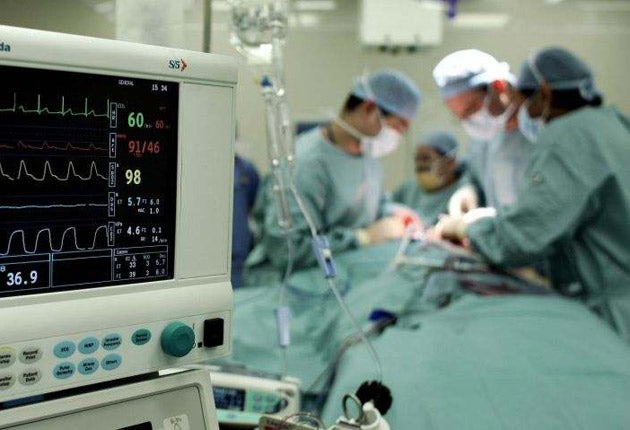NHS 'should sack 137,000 of its staff'
Report commissioned by ministers spells out steps to meet efficiency targets

The National Health Service workforce will have to be cut by 137,000 to achieve planned £20bn efficiency savings by 2014, ministers have been told.
A leaked report by management consultants called in by the Government calls for the number of NHS staff to be reduced by 10 per cent in England. It is the most graphic evidence to date of the painful cuts in public spending ahead as the Government tries to fill the black hole in its finances.
The proposed job cull, which would affect clinical staff as much as administrators, could undermine Labour's attempts to fight the general election by warning that an incoming Tory government would take an axe to vital front-line services. David Cameron has pledged to raise the health budget in real terms every year.
The confidential report by McKinsey & Company, leaked to the Health Service Journal, recommends a recruitment freeze starting in the next two years, a reduction in medical school places starting in October and an early retirement programme to encourage older GPs and community nurses to make way for "new blood/talent".
The document will also reopen the debate over whether the extra billions pumped into the NHS by Labour have delivered value for money. It says £2.4bn could be saved if hospitals with the lowest levels of staff productivity pulled themselves up to nearer the average.
The analysis, which was presented to the Department of Health in March, has been disseminated among senior NHS managers. Asked whether the report concurred with the department's own analysis and policy, Mike O'Brien, the Health minister, told the magazine that McKinsey's work was "not in any sense an NHS plan of action" but that it would be considered.
Last night Mr O'Brien insisted: "Ministers have rejected the suggested proposals in the McKinsey report and there are no plans to adopt these proposals in the future. The Government does not believe the right answer to improving the NHS now or in the future is to cut the NHS workforce. In core front-line services like maternity, nursing and primary care we need more staff rather than fewer."
Nigel Edwards, director of policy at the NHS Confederation, which represents 95 per cent of the organisations in the service, said there would likely be a £15bn shortfall in NHS funds by 2016. He added that on average 30,000 people a year retired and a substantial number left the NHS, so it was possible to reduce the head count without the need for massive redundancies.
Andrew Lansley, the Shadow Health Secretary, accused the Government of drawing up secret plans for swingeing cuts. "Clearly we need to get better value for money from the NHS, so we applaud any drive for greater efficiency, but it is extraordinary that Labour plan to take an axe to the hospital budget rather than to the bloated health bureaucracy. Only a fifth of job cuts would be within the bureaucracy, meaning the vast majority to go would be front-line NHS staff," he said.
Karen Jennings, head of health at Unison, the public service trade union, said: "The McKinsey report comes up with the same old formulaic answers and their much-repeated mantra of job cuts as the answer to NHS savings... We must constantly look for new ways to be efficient and to deliver better patient care, but the Government would be right to question the wisdom of putting these proposals into action.
"Management consultants prepare their statistics and graphs and put them into reports, without having responsibility for the consequences," she said.
The NHS in numbers
701,831 NHS medical staff, including 37,213 GPs; 84,595 hospital doctors; 408,160 nurses; 11,854 dentists and dental staff; 142,558 other medical staff and 17,451 members of ambulance crews.
666,863 Non-medical staff, including 355,010 clinical support workers; 179,151 administrators; 39,913 senior managers; 353 other non-medical staff and 92,436 non-medical GP surgery staff.
Join our commenting forum
Join thought-provoking conversations, follow other Independent readers and see their replies
Comments
Bookmark popover
Removed from bookmarks